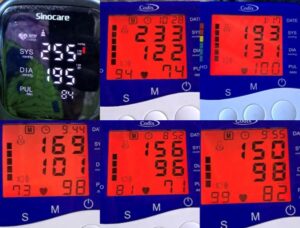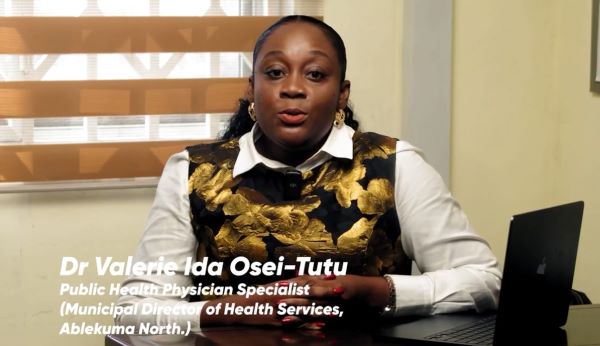Regular medical check-ups and patient health data analysis by health-tech start-up Knoxxi Health Ghana at Mallam Market has revealed that over 70 percent of traders in that market have various stages of high blood pressure; but are unaware.

In a significant community health initiative, Knoxxi Health, in collaboration with the Ablekuma North Health Directorate, provided free health check-ups to market women at Mallam Market for one month. The pilot programme benefitted at least 1,580 women, offering vital health services aimed at promoting wellness and early detection of potential health issues.
This partnership highlights the importance of accessible healthcare for underserved communities, particularly for women who form the backbone of local economies. Afterwards, Knoxxi Health continued this operation at a subsidised fee. Blood pressure, blood sugar, oxygen, body temperature, mental health state, body mass index (BMI) and other vitals needed to determine one’s state of health were checked.
The results showed that only 28.3 percent of them had normal blood pressure while the remaining 71.7 percent, mainly women, had between stage one to crisis stage hypertension.

Per the report from Knoxxi Health, 31.9 percent of the traders had stage one hypertension, 22.9 percent had stage two hypertension, 14.9 percent had reached elevated level blood pressures, while a few – 2.09 percent – had reached crisis level.
In terms of the age range, majority of the crisis cases were persons of ages 65 and above, while a few of them – between the ages of 25 and 64 – also had conditions that could be described as crisis. Whereas just a few (26) have reached the crisis level, it is also instructive to note that a significant 38 percent (471) of the women were found with stages two and or elevated blood pressure conditions, which is worrying and needs urgent intervention.

Drone view of the Mallam Market
Founder and Chief Executive of Knoxxi Health, Michael Amankwa, who led the team, described the situation as alarming, saying that before the screenings, Knoxxi did a survey in the market and over 78 percent of the women confidently said they did not have high blood pressure. However, the screening revealed the opposite, indicating that many people are living with non-communicable health conditions they may not be aware of.
He said one of their worrying findings was that people are very much aware they need regular health check-ups and care, but they simply do not make time to attend to their health because they don’t want to leave their stalls and miss out on making a profit. A number of them also appeared unbothered.
“Even after we had shown the results to the women and given some of them referrals, a lot of them simply refused to go for healthcare, so we had to work with the Ablekuma North Health Directorate to take at least two medical doctors to the market to consult those who needed it urgently,” he stated.
Meanwhile, per the report, although cases of blood sugar levels were not as alarming as those of hypertension, there were over 47 percent of the market women whose fasting blood sugar results – before meals – indicated possible prediabetic and diabetic conditions, while 15 percent showed diabetic and prediabetic conditions after meals.

Michael Amankwa said Knoxxi Health does not diagnose diseases and does not prescribe medication, but uses technology to help people track their vital signs by providing free to highly subsidised regular vital signs monitoring to collect the necessary data.
They then upload the data onto the Knoxxi Health monitoring platform and analyse the data to provide insights to the clients regularly. So, where there is a need for the client to take action, Knoxxi provides real-time health tips and educational information. The entire process is highly digitised.
“The kicker is the digitalisation – the insights provided will help us achieve our ultimate goal, which is to successfully predict when the patient will be sick or unwell and when they are likely to develop chronic diseases. We also measure if the medications they are taking are working or not,” Amankwa said.
In the case of Mallam Market, the women pay a paltry GH¢15 per visit to access the health monitoring service Knoxxi Health provides them.
As part of its support, Knoxxi dispatches its Health Connect Team (field health agents) to markets to perform vital sign checks on women four times a month. These well-scheduled visits target designated groups of customers daily, ensuring consistent health monitoring and providing actionable insights to clients.
The collaboration with the Ablekuma North Health Directorate extends beyond basic assistance. Knoxxi provides a comprehensive dashboard of patient insights to medical professionals at the directorate, enabling them to closely monitor results and track changes in records.
This data-driven approach empowers healthcare providers to offer personalised advice and support to patients based on real-time information. This means Knoxxi Health is also employing young people. Michael Amankwa said the company plans to have at least 100,000 health agents across the country within the next seven to eight years.
He assured users of complete data protection both in transit and in storage, adding that customers can always have their data deleted from the health monitoring service upon request.

Public Health Physician Specialist at the Ablekuma North Health Directorate, Dr. Valerie Ida Osei-Tutu, noted that one of the objectives of Ghana’s Non-Communicable Diseases (NCD) Policy is to strengthen early detection and management to reduce morbidity and mortality from NCDs.
She noted that NCDs have become a big challenge at Ablekuma North, and the goal is not just to treat them when they happen, but also to prevent them; and that is why the intercession by Knoxxi Health, through technology, is critical.
“Partnering with Knoxxi Health has enabled us to adopt a more modern and proactive approach to healthcare. By leveraging technology to monitor key health metrics, we can intervene early and provide the necessary support effectively,” she said.

According to the Principal Nursing Officer and CHPS Coordinator at Ablekuma North, Jemima Adiyiah Obeng, through their collaboration with Knoxxi, they can reach these women and provide them with the help they need.
She explained that the Knoxxi Health platform enables them to monitor key vital signs, including blood pressure, blood sugar, oxygen levels and other critical indicators. This capability allows them to detect early warning signs in near real time.
“The Knoxxi Health solution is a practical preventative measure helping us to keep our communities strong and healthy,” she said.

Ethel Nerkai Akosen, Deputy Chief Nursing Officer and Head of Nursing at the Ablekuma North Health Directorate, said Knoxxi Health’s solution is making it easier to keep track of patients’ vital signs and follow up as needed, adding that nurses are now able to identify health risks in patients sooner and provide ongoing support, which make a tremendous difference.
Beyond helping health professionals to keep track of their patient’s health status and providing the needed intervention timeously, the Knoxxi Health solution also empowers the patients themselves with the knowledge needed to take the necessary action.
On the back of the data provided by Knoxxi Health, the Medical Officer at Kwashieman Medical Centre, Dr. Seth Takyi, said he meets with the market women twice every month to discuss changes in their vital signs that require attention, adding that the regular meetings help them to catch issues early and provide the needed medical advice or treatment. “This programme is helping us make preventive care easily accessible and impactful, especially to the critical part of our community,” he said.
The market women themselves expressed their profound gratitude to the Knoxxi Health team and health professionals from the Ablekuma North Health Directorate for the continuous help they provide them to keep them in good shape health-wise.
Meanwhile, Knoxxi Health will be extending its help to the Madina Market in Accra soon, and several companies are also gearing up to offer the Knoxxi Health solution to their employees because it is a smarter approach to preventive healthcare due to the frequent checks and insights at a very affordable cost.










